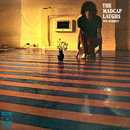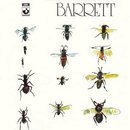Roger Keith Barrett was born on January 6, 1946 in Cambridge, England. The young Roger was actively encouraged in his music and art by his parents, Max and Winifred – at the age of seven he won a piano duet competition with his sister – and he was to be successful in poetry contests while at Cambridge High School.










He knew Roger Waters from primary school and met David Gilmour as a teenager, so their paths were to cross many times before the formation of Pink Floyd. Roger Barrett acquired the nickname 'Syd' around the age of 14, in a reference to local bass player Sid Barrett, hence the 'Syd' spelling for differentiation, although other sources suggest the name had already been given to him at Scout camp.
Read more >>>
After a stint at Cambridge School of Art, Syd moved to London to attend Camberwell Art College, and eventually hooked up with Roger Waters, who was attending Regent Street Polytechnic.
Prior to that, Syd had become a notable and popular bohemian figure on the Cambridge scene, swapping guitar chords with David Gilmour and avidly enjoying a wide range of musical influences from jazz to obscure blues combos. By the time he moved to London he had already been part of local bands including Geoff Mott and the Mottoes, born out of collaborations at the Barrett family home from 1962 onwards.
On return trips to Cambridge he began playing guitar with The Hollerin' Blues, who by 1965 had turned into Those Without. Meanwhile Roger Waters had formed a band called Sigma 6 with college friends including Richard Wright and Nick Mason. When two of the 6 left, there was space for Syd to join, along with Rado ('Bob') Klose. After some personnel and name changes, the band finally settled down into the Barrett / Mason / Waters / Wright lineup in the summer of 1965 under the name of Pink Floyd, suggested by Syd and based on US bluesmen Pink Anderson and Floyd Council.
Floyd (alternatively known as The Tea Set throughout 1965) was still a part-time band, allowing Syd to take off to France in August with David Gilmour, the pair being briefly detained by the St. Tropez police for busking.
Pink Floyd/Tea Set's original style was based on American blues and r'n'b, but the birth of a UK psychedelic music scene allowed them to develop Syd's performance-based ideas into something unique. Throughout 1966 they honed their live performance skills, often developing songs into long jamming sequences, and by the end of the year Pink Floyd had become the pre-eminent 'underground' band. They picked up management too, and their first recordings were songs by Syd, who had established himself as the band's creative innovator.
Pink Floyd signed to EMI Records in 1967, releasing the singles Arnold Layne and See Emily Play, both written by Syd, and the album The Piper At The Gates Of Dawn, again mostly composed by Syd and considered to be one of the greatest British psychedelic albums.
However, as the band began to attract a large fanbase, it became clear that Syd's fluid approach to writing, performing and recording – spontaneous, one take only, nothing repeated – was increasingly at odds with the expectations of a musical scene that was still very conservative, especially outside London.
Possibly exacerbated by Syd's frequent experimentation with psychedelic drugs, his behaviour became more erratic, to the point that the band decided to add a second guitarist for live performances. They hoped to call on Syd's compositional abilities for studio work, similar to Brian Wilson's role in the Beach Boys, while David Gilmour would bolster the band in live shows. The experiment didn't really work and, in January 1968, after a handful of shows as a 5-piece, the band elected not to pick Syd up on the way to a Southampton University show.
Syd and Floyd officially parted company in March 1968, with the band's management Blackhill Enterprises deciding to stick with Syd as a solo artist.
EMI's new Harvest label committed to a Barrett solo project, and over the course of a year Syd recorded The Madcap Laughs. Started briefly with Blackhill's Peter Jenner, recording commenced in earnest in April 1969 with EMI's Malcolm Jones, later involving David Gilmour and Roger Waters, who completed the album in October for release in January 1970.
The Madcap Laughs was well received and sold reasonably by the standards of the time, so EMI decided to record a follow-up straight away. The sessions for the album Barrett started on February 26, 1970, with David Gilmour as producer, Richard Wright on keyboards and Humble Pie's Jerry Shirley on drums. Sessions in April and July followed, and the album was released in November 1970, the last official Syd Barrett album, bar compilations.
Syd undertook very little musical activity between 1968 and 1972 outside the studio. On February 24, 1970, he appeared on John Peel's BBC radio programme Top Gear playing five songs, only one of which had been previously released. Three would be re-recorded for the Barrett album, while the song Two of a Kind (by Richard Wright) was a one-off.
David Gilmour and Jerry Shirley also backed Syd for his one and only live concert during this period, on June 6, 1970; the trio played four songs at the Olympia Exhibition Hall, London, part of a Music and Fashion Festival. Syd made one last appearance on BBC Radio, recording three songs from Barrett on February 16, 1971.
In 1972, Syd formed a short-lived band called Stars with ex-Pink Fairies member Twink on drums and Jack Monck on bass. Though the band was initially well received, one of their gigs at the Corn Exchange in Cambridge was disastrous, and Syd quit the band after a scathing review.
In August 1974, Peter Jenner convinced Syd to return to Abbey Road Studios in hope of recording another album, but little came of the sessions. Syd withdrew from the music industry and subsequently returned to Cambridge for a life of painting, creating large abstract canvases.
Syd had one noted reunion with the members of Pink Floyd on June 5, 1975 during the recording sessions for Wish You Were Here, when he turned up at Abbey Road unannounced as the band were working on Shine On You Crazy Diamond.
In 1988, EMI Records released an album of Syd's studio out-takes and previously unreleased material recorded from 1968 to 1970 under the title of Opel, a highly-regarded track omitted from The Madcap Laughs. 1993's Crazy Diamond is a box set of all three albums, each loaded with further out-takes from his solo sessions. The Best Of Syd Barrett: Wouldn't You Miss Me? was released by EMI in the UK in April 2001, and in the U.S. in September of that year.
Roger 'Syd' Barrett died of pancreatic cancer on July 7, 2006 at Addenbrooke's Hospital in Cambridge, but his legacy lives on in the acknowledgement of his increasing influence over scores of musicians. A short list of artists who have recorded his compositions would include Kevin Ayers, David Bowie, The Damned, Marianne Faithfull, Flaming Lips, John Frusciante, Robyn Hitchcock, The Jesus & Mary Chain, The Lightning Seeds, Love & Rockets, Marc & The Mambas, Pearl Jam, Phish, Placebo, Primal Scream, R.E.M., The Smashing Pumpkins, The Soft Boys, Soundgarden, and Tangerine Dream.
A tribute concert for Syd was held at London's Barbican Theatre on May 10, 2007, curated by Nick Laird-Clowes and Joe Boyd. Roger Waters performed Flickering Flame solo, and David Gilmour, Richard Wright and Nick Mason performed Arnold Layne. Other musicians paying tribute included Damon Albarn, Kevin Ayers, Captain Sensible, Mike Heron, Robyn Hitchcock, Chrissie Hynde, John Paul Jones, Kate McGarrigle, and Martha Wainwright.
In 2010, EMI Records released An Introduction To Syd Barrett, a new collection that brought together for the first time tracks from Syd's Pink Floyd and solo work on one album, including some brand-new remixes. David Gilmour was executive producer of the album, and, together with Andy Jackson and Damon Iddins at Astoria Studios, remixed five tracks, including Octopus, She Took A Long Cool Look, Dominoes, and Here I Go. David Gilmour also added bass guitar to Here I Go, while Pink Floyd's Matilda Mother also received a fresh 2010 Mix. Brand new artwork in a gatefold sleeve, including 4-colour liner notes with brand-new graphics and all lyrics, was provided by long time Pink Floyd associate and friend of Syd, Storm Thorgerson and his studio.
On March 18, 2011 a new book entitled Barrett, The Definitive Visual Companion, was published by Essential Works, authors Russell Beecher and Will Shutes drawing on their extensive research to show Syd's work and life, resulting in a comprehensive study of Syd the artist. Containing the largest collection of Syd Barrett-related images ever assembled, the book includes hundreds of unseen and rare photographs of Syd and Pink Floyd, Syd's personal love letters and all of Syd's original artworks. The book offers an unprecedented insight into Syd's life and includes comments from, and archive interviews with, many of Syd's friends and colleagues including Joe Boyd, Barry Miles, Libby Gausden-Chisman, Nigel Lesmoir-Gordon, Jenny Spires and many more.